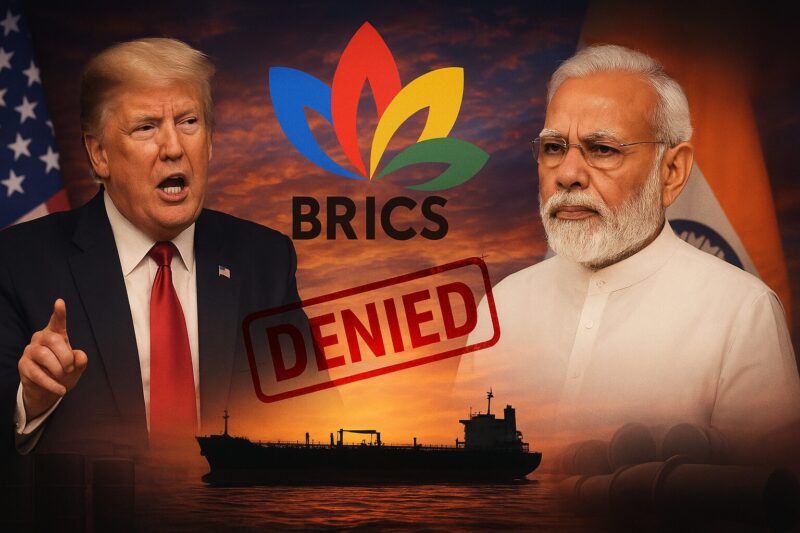India’s Russian oil imports turned into a major diplomatic issue this week after US President Donald Trump claimed that Prime Minister Narendra Modi had agreed to stop buying oil from Russia—but New Delhi quickly denied knowing anything about it. Trump made the announcement on Wednesday, saying Modi had “assured me today that they (India) will not be buying oil from Russia,” and he called it a “big step” given the sanctions against Moscow. However, on Thursday, India’s foreign ministry spokesperson Randhir Jaiswal told reporters he was “not aware of any conversation” between the two leaders about halting India’s Russian oil imports.
Also Read: Trump Upends India’s Grand Strategy: Shift Toward Russia-China Bloc
India’s Russian Oil Imports Drive India-US Tensions and BRICS Market Moves


Trump’s Claims Contradicted by New Delhi
This has shown the current tension in the relationship between Washington and New Delhi on the matter of energy policy with the contradiction that what Trump said and what India actually confirmed. Currently, the foreign ministry of India released a statement stating that India was a major importer of oil and gas and that any Indian purchase of Russian oil will advance two objectives of steady energy prices and reliable supplies.
The ministry’s statement emphasized India’s approach:
“Ensuring stable energy prices and secured supplies have been the twin goals of our energy policy. This includes broad-basing our energy sourcing and diversifying as appropriate to meet market conditions.”
For months now, New Delhi has been resisting Trump’s calls to stop purchasing Russian crude, and officials say they won’t compromise the energy needs of the booming economy and the population of more than 1.4 billion people.
India and Russia Trade Volumes Prove Critical
Russia has emerged as India’s largest oil supplier since the 2022 invasion of Ukraine, which triggered massive sanctions against Moscow’s oil industry. At the time of writing, Russia is delivering roughly 1.7 to 1.8 million barrels per day to India, and these volumes make India’s Russian oil imports critical to the country’s energy security.
India maintains close ties with the Kremlin and will actually host Russian President Vladimir Putin later this year, which shows how Russia and India within BRICS continue their cooperation.
Muyu Xu, a senior oil analyst at trade intelligence firm Kpler, explained the challenge:
“I don’t think India can stop buying Russian oil overnight. The volumes are simply too large. Replacing that volume from the spot market is no easy task. Beyond the sheer quantity, differences in crude quality and refinery yields make substitution far from a one for one swap.”
Data from Kpler shows that state-owned refiners have trimmed back their purchases in recent months, but some private players have actually increased their intake. Indian Oil Corporation Limited, which is state-owned, purchased 10.35 million barrels in January compared to just 4.62 million barrels in September. So far in October, Indian Oil Corporation Limited purchased 7.03 million barrels, the data showed.
US Tariffs Escalate Pressure on India
Trump announced an additional 25% tariff on India back in August as a penalty for importing oil and gas from Russia, and this came on top of a tariff rate he announced previously at 25%. The Trump administration has escalated tensions with its pressure on India regarding Russian oil, but Modi’s government stands firm on prioritizing national energy interests.
Modi’s refusal to bend to US pressure plays into his political brand, which he built around the image of a strong leader helming an India that focuses on its own interests on the world stage. This stance resonates domestically, and it also reinforces India’s position within BRICS as a nation that makes independent decisions on Russia’s oil and other strategic matters.
Diplomatic Efforts Continue Despite Oil Dispute
Indian Foreign Minister S. Jaishankar acknowledged earlier this month that there are issues between the two countries. He said:
“Those issues need to be negotiated and discussed and resolved, which is exactly what we are trying to do.”
He also noted the specific challenge in trade discussions:
“We have not arrived at a landing ground for our trade discussions.”
In recent weeks, officials from New Delhi and Washington have been focusing on diplomacy to get the relationship back on track, with trade delegations working on closing a deal. Yet the issue of India and Russia cooperation on oil remains a major stumbling block, and the conflicting statements this week suggest that any resolution is still far off.
It also leaves the question of whether US tariffs and sanctions are able to truly influence the transformation of how India sources energy especially with Russia proving to become such a critical source. As the country of India faces the threat of energy security, and with the political reputation of Modi being linked to defending national interests, the way out seems hard on both fronts. The progress of the news surrounding the India and Russia oil trade is one that will be followed keenly in the next few weeks as these two countries manoeuvre their way through these tensions.
Also Read: Country With $4 Trillion GDP Is Against BRICS Currency





